Charles E W Bean, Diaries, AWM38 3DRL 606/2/1 - January - March 1915 - Part 1

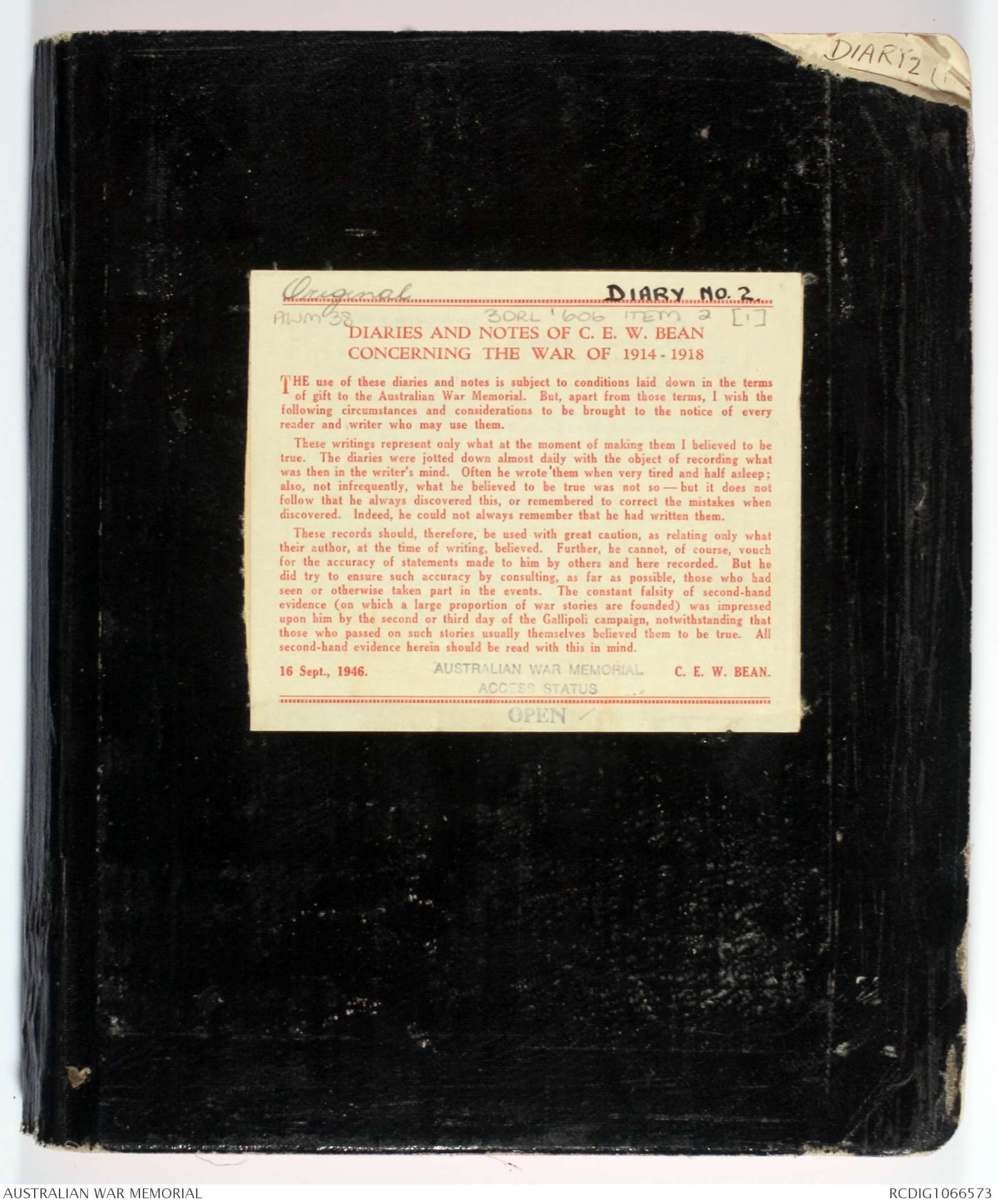
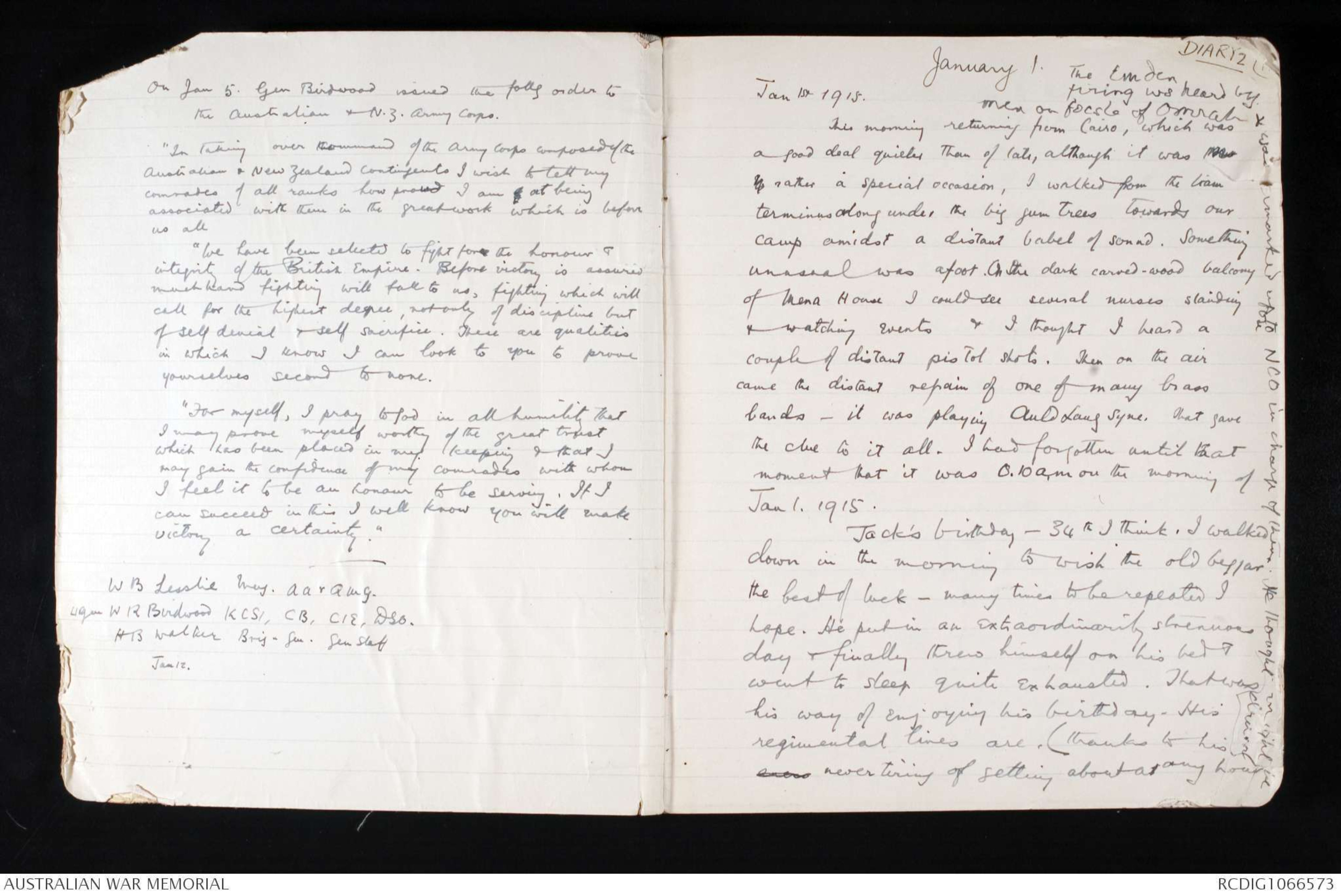
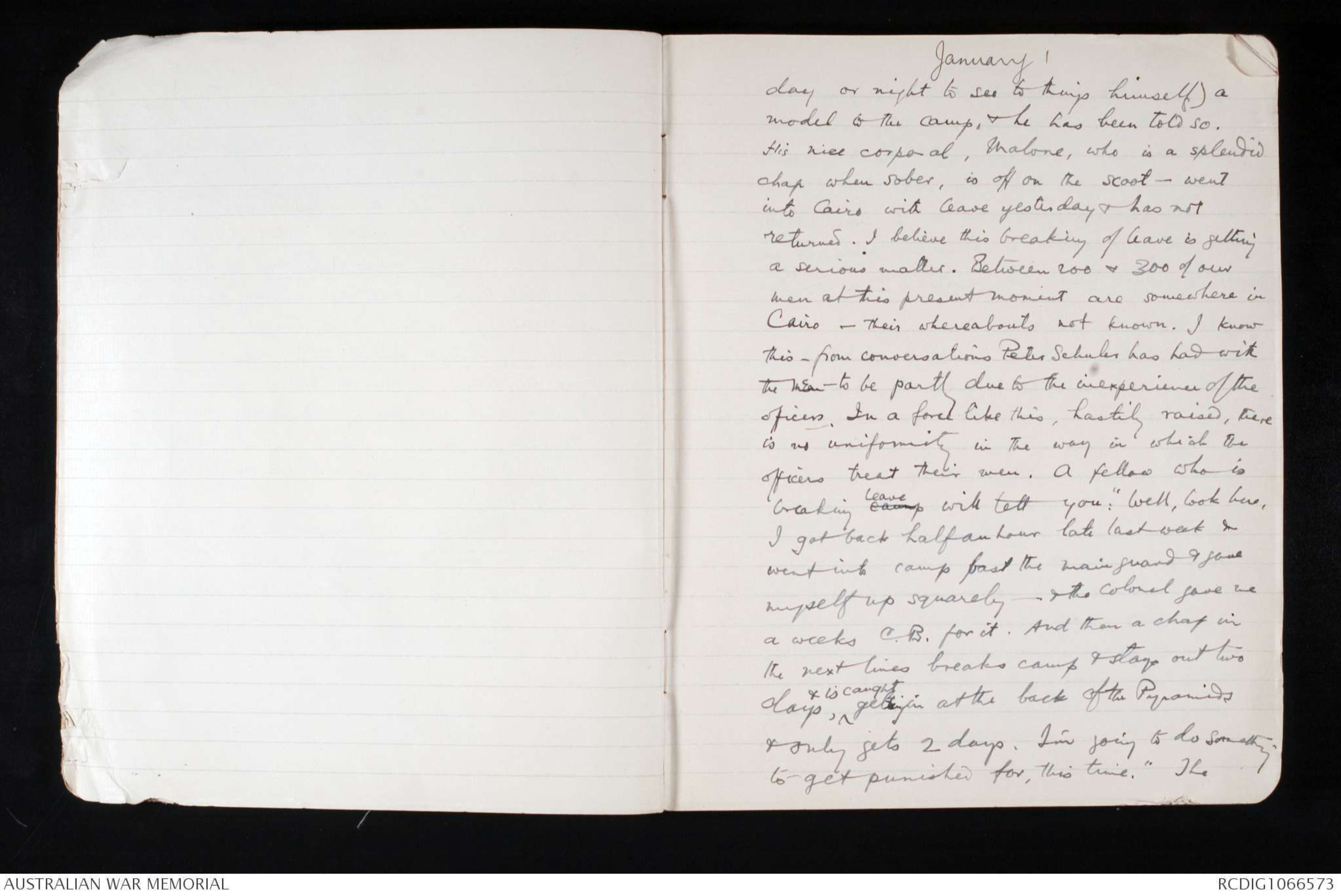
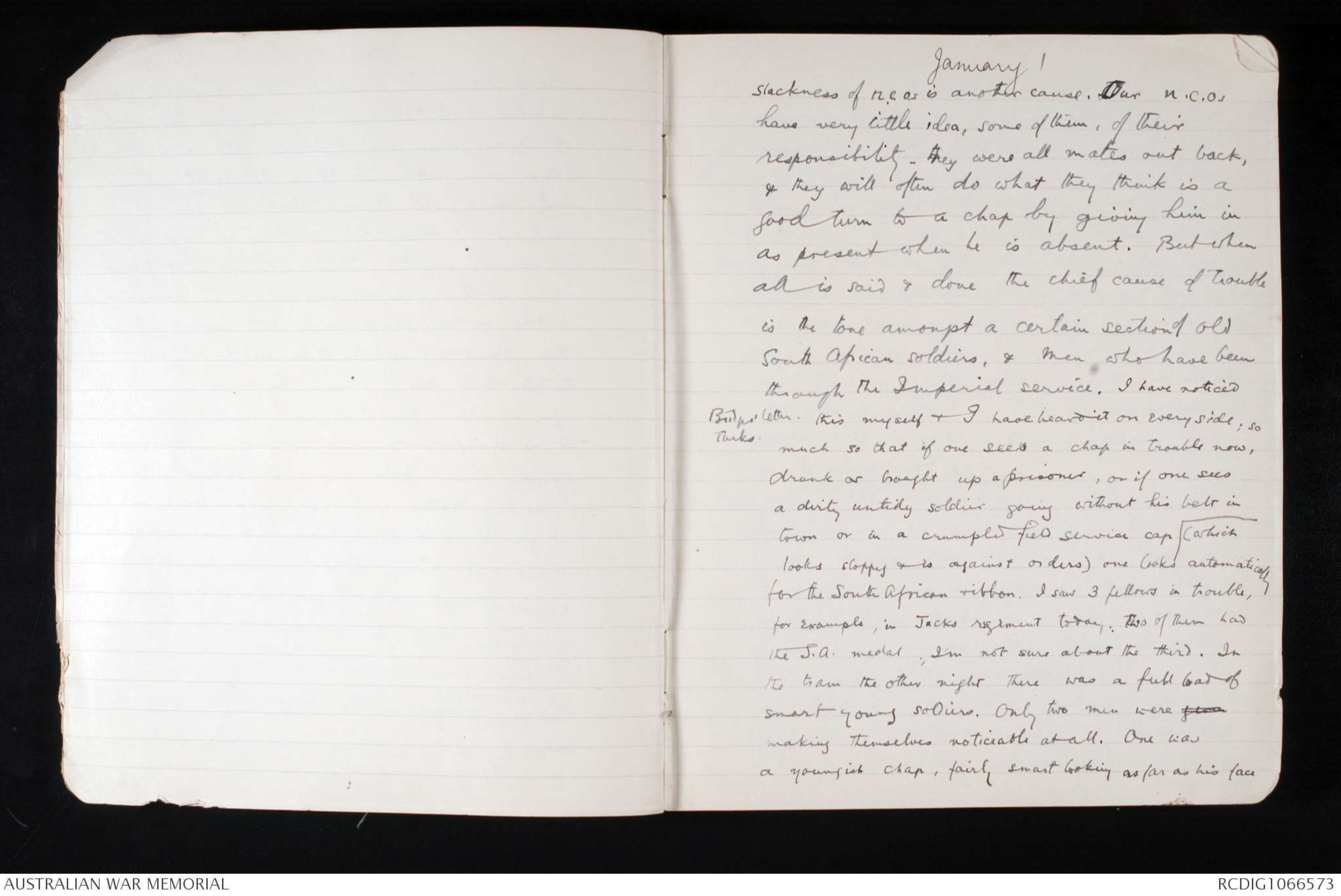
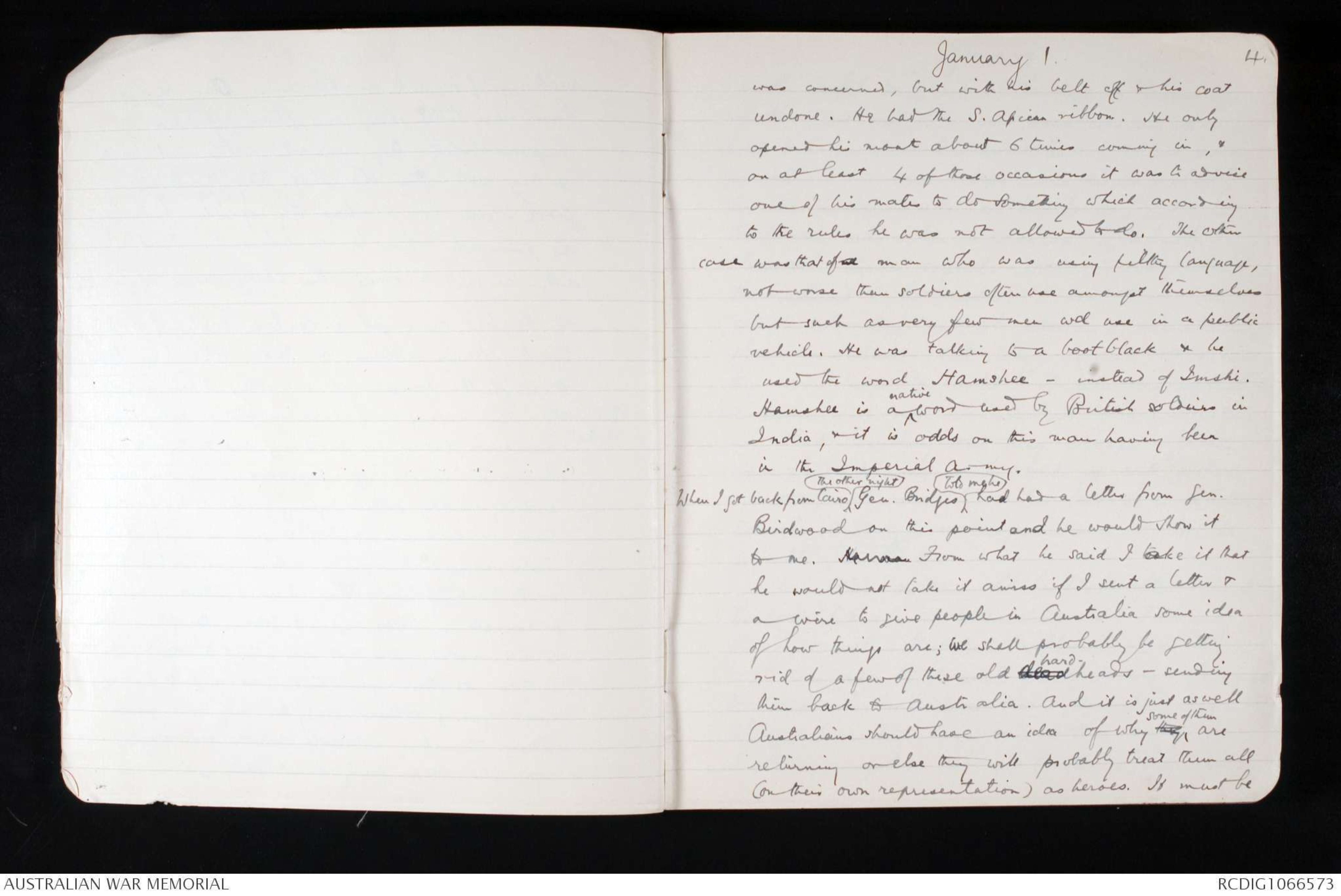
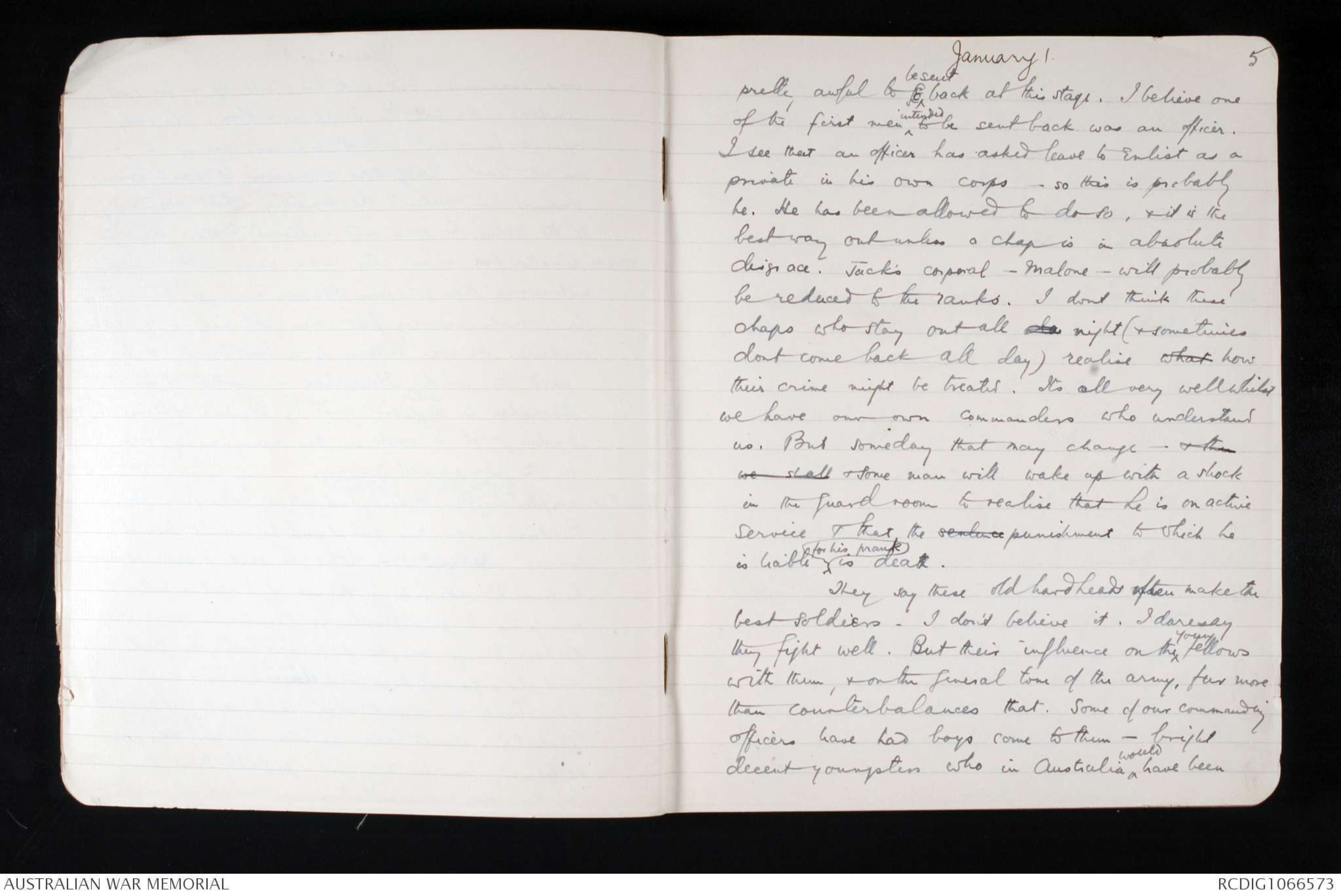
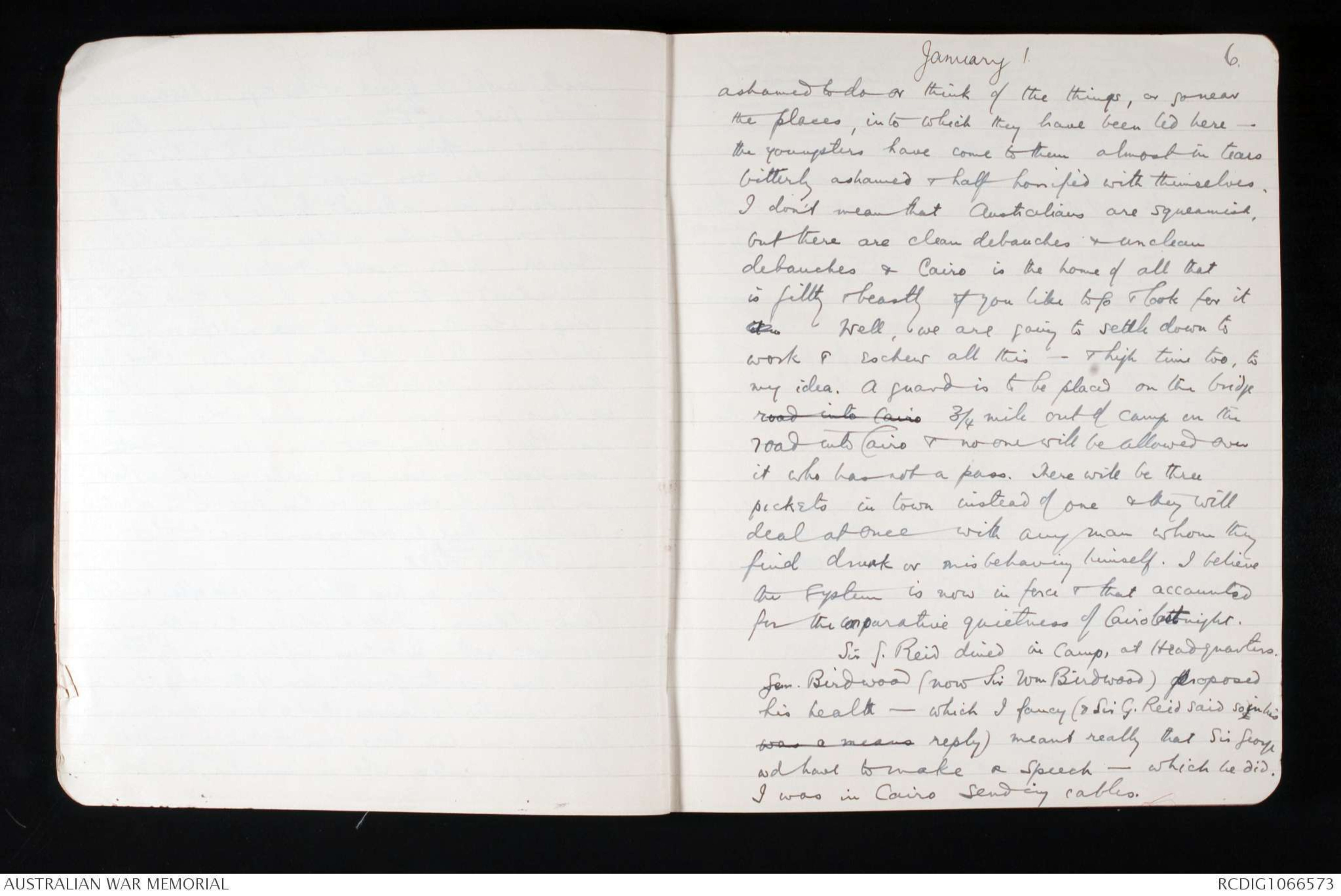
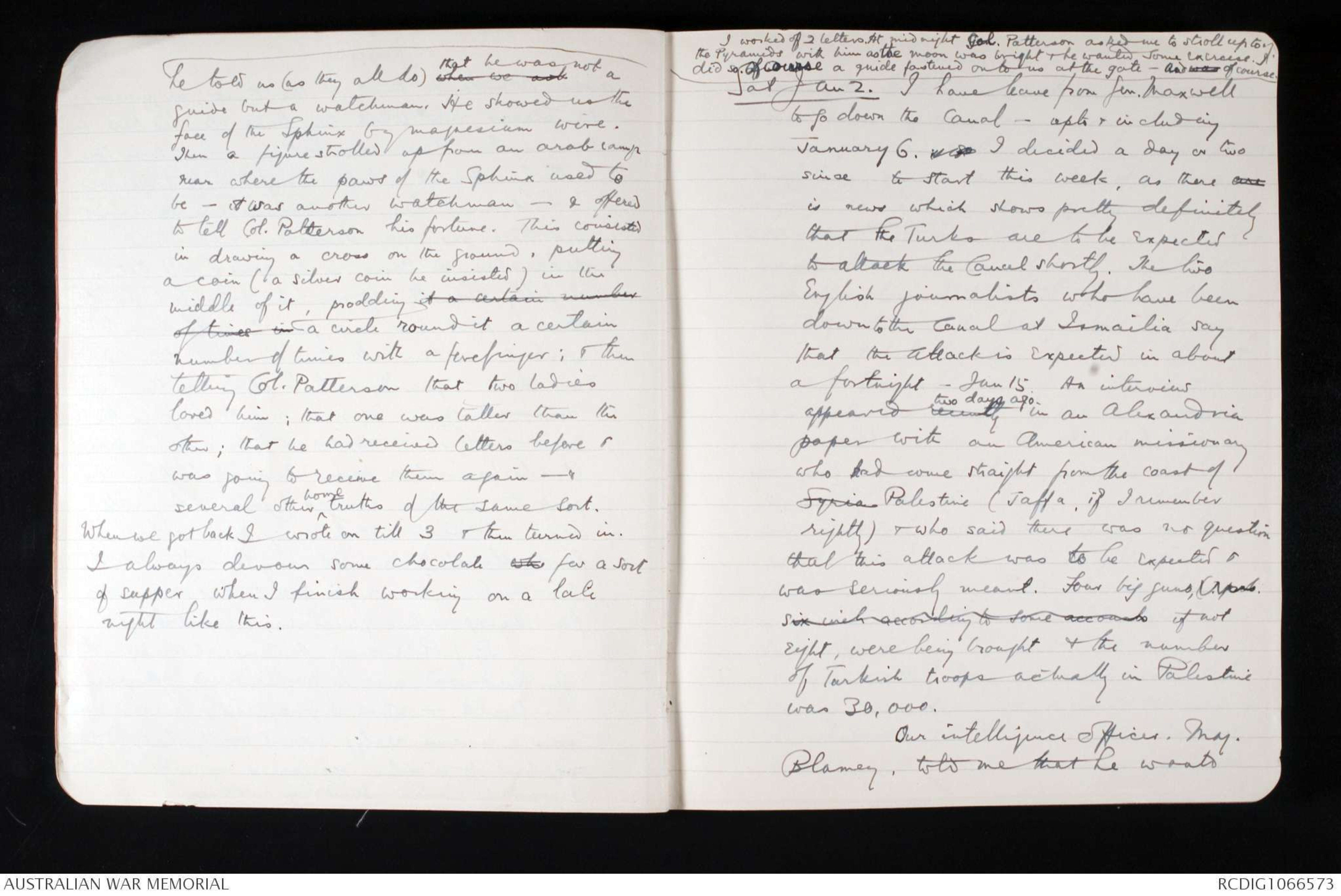
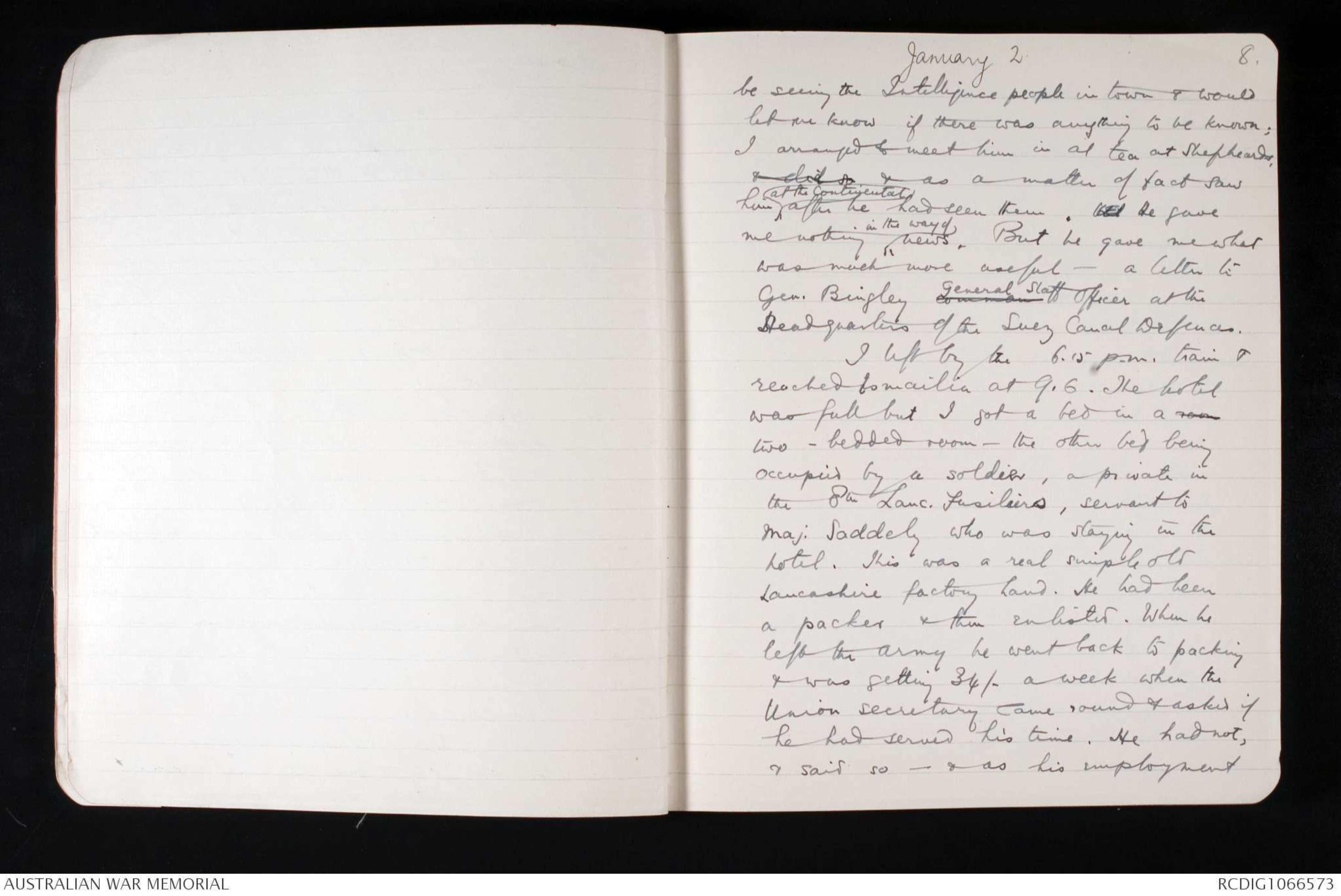
AWM38
Official History,
1914-18 War: Records of C E W Bean,
Official Historian.
Diaries and Notebooks
Item number: 3DRL606/2/1
Title: Diary, January - March 1915
Comments on soldiers' reactions to Bean's
despatch critical of their behaviour, training and
sight seeing.
AWM38-3DRL606/2/1
DIARY2
Original DIARY NO. 2.
AWM38 3DRL ' 606 ITEM 2 [1]
DIARIES AND NOTES OF C. E. W. BEAN
CONCERNING THE WAR OF 1914 - 1918
THE use of these diaries and notes is subject to conditions laid down in the terms
of gift to the Australian War Memorial. But, apart from those terms, I wish the
following circumstances and considerations to be brought to the notice of every
reader and writer who may use them.
These writings represent only what at the moment of making them I believed to be
true. The diaries were jotted down almost daily with the object of recording what
was then in the writer’s mind. Often he wrote them when very tired and half asleep;
also, not infrequently, what he believed to be true was not so — but it does not
follow that he always discovered this, or remembered to correct the mistakes when
discovered. Indeed, he could not always remember that he had written them.
These records should, therefore, be used with great caution, as relating only what
their author, at the time of writing, believed. Further, he cannot, of course, vouch
for the accuracy of statements made to him by others and here recorded. But he
did try to ensure such accuracy by consulting, as far as possible, those who had
seen or otherwise taken part in the events. The constant falsity of second-hand
evidence (on which a large proportion of war stories are founded) was impressed
upon him by the second or third day of the Gallipoli campaign, notwithstanding that
those who passed on such stories usually themselves believed them to be true. All
second-hand evidence herein should be read with this in mind.
16 Sept., 1946. C. E. W. BEAN.
AUSTRALIAN WAR MEMORIAL
ACCESS STATUS
OPEN
On Jan 5. Gen Birdwood issued the follg order to
the Australian & N.Z. Army Corps.
"In taking over command of the Army Corps composed of the
Australian & New Zealand contingents I wish to tell my
comrades of all ranks how proud I am f at being
associated with them in the great work which is before
us all
"We have been selected to fight forx the honour &
integrity of the British Empire. Before victory is assured
much hard fighting will fall to us, fighting which will
call for the highest degree, not only of discipline but
of self denial & self sacrifice. These are qualities
in which I know I can look to you to prove
yourselves second to none.
"For myself, I pray to God in all humility that
I may prove myself worthy of the great trust
which has been placed in my keeping & that I
may gain the confidence of my comrades with whom
I feel it to be an honour to be serving. If I
can succeed in this I well know you will make
victory a certainty."
WB Lesslie Maj. AA & QMG.
Lt Gen WR Birdwood KCSI, CB, CIE, DSO.
HB Walker Brig-Gen. Gen staff
Jan 12.
DIARY2
January 1.
[*The Emden
firing ws heard by
men on focsle of Omrah &
was remarked upon to NCO in charge of them. He thought might be drum*]
Jan 1st 1915.
This morning returning from Cairo, which was
a good deal quieter than of late, although it was mxxy rather a special occasion, I walked from the train
terminus along under the big gum trees towards our
camp amidst a distant babel of sound. Something
unusual was afoot. On the dark carved-wood balcony
of Mena House I could see several nurses standing
& watching events & I thought I heard a
couple of distant pistol shots. Then on the air
came the distant refrain of one of many brass
bands - it was playing Auld Lang Syne. That gave
the clue to it all. I had forgotten until that
moment that it was 0.10 am on the morning of
Jan 1. 1915.
Jack's birthday - 34th I think. I walked
down in the morning to wish the old beggar
the best of luck - many times to be repeated I
hope. He put in an extraordinarily strenuous
day & finally threw himself on his bed &
went to sleep quite exhausted. That was
his way of enjoying his birthday - His
regimental lines are, (thanks to his ever never tiring of getting about at any hour
January 1
day or night to see to things himself) a
model to the camp, & he has been told so.
His nice corporal, Malone, who is a splendid
chap when sober, is off on the scoot - went
into Cairo with leave yesterday & has not
returned. I believe this breaking of leave is getting
a serious matter. Between 200 & 300 of our
men at this present moment are somewhere in
Cairo - their whereabouts not known. I know
this - from conversations Peter Schuler has had with
the men - to be partly due to the inexperience of the
officers. In a force like this, hastily raised, there
is no uniformity in the way in which the
officers treat their men. A fellow who is
breaking camp leave will tell you: "Well, look here,
I got back half an hour late last week &
went into camp past the main guard & gave
myself up squarely – & the Colonel gave me
a weeks C.B. for it. And then a chap in
the next lines breaks camp & stays out two
days, ^ & is caught getting in at the back of the Pyramids
& only gets 2 days. I'm going to do something
to get punished for, this time." The
January 1
slackness of N.CO.s is another cause. Our N.C.Os
have very little idea, some of them, of their
responsibility. They were all mates out back,
& they will often do what they think is a
good turn to a chap by giving him in
as present when he is absent. But when
all is said & done the chief cause of trouble
is the tone amongst a certain section of old
South African soldiers, & men who have been
through the Imperial service. I have noticed
[*Bridges' letter.
Turks.*]
this myself & I have heard it on every side; so
much so that if one sees a chap in trouble now,
drunk or brought up a prisoner, or if one sees
a dirty untidy soldier going without his belt in
town or in a crumpled field service cap (which
looks sloppy & is against orders) one looks automatically
for the South African ribbon. I saw 3 fellows in trouble,
for example, in Jacks regiment today, two of them had
the S.A. medal; I'm not sure about the third. In
the train the other night there was a full bar of
smart young soldiers. Only two men were given
making themselves noticeable at all. One was
a youngish chap, fairly smart looking as far as his face
4.
January 1
was concerned, but with his belt off & his coat
undone. He had the S. African ribbon. He only
opened his mouth about 6 times coming in, &
on at least 4 of those occasions it was to advise
one of his mates to do something which according
to the rules he was not allowed to do. The other
case was that of one man who was using filthy language,
not worse than soldiers often use amongst themselves
but such as very few men wd use in a public
vehicle. He was talking to a boot black & he
used the word Hamshee – instead of Imshi.
Hamshee is a ^ native word used by British soldiers in
India, & it is odds on this man having been
in the Imperial Army.
When I got back from Cairo ^ the other night Gen. Bridges ^told me he had had a letter from Gen.
Birdwood on this point and he would show it
to me. He was From what he said I take it that
he would not take it amiss if I sent a letter &
a wire to give people in Australia some idea
of how things are; we shall probably be getting
rid of a few of these old dead ^ hard heads - sending
them back to Australia. And it is just as well
Australians should have an idea of why they ^ some of them are
returning or else they will probably treat them all
(on their own representation) as heroes. It must be
5
January 1.
pretty awful to f ^ be sent back at this stage. I believe one
of the first men ^ intended to be sent back was an officer.
I see that an officer has asked leave to Enlist as a
private in his own corps - so this is probably
he. He has been allowed to do so, & it is the
best way out unless a chap is in absolute
disgrace. Jack's corporal - Malone - will probably
be reduced to the ranks. I don't think these
chaps who stay out all da night (& sometimes
dont come back all day) realise what how
their crime night be treated. Its all very well whilst
we have our own commanders who understand
us. But someday that may change - & thenwe shall & some man will wake up with a shock
in the guard room to realise that he is on active
service & that the sentence punishment to which he
is liable ^ for his prank is death.
They say these old hardheads often make the
best soldiers . I don't believe it. I daresay
they fight well. But their influence on the ^ young fellows
with them, & on the general tone of the army, far more
than counterbalances that. Some of our commanding
officers have had boys come to them - bright
decent youngsters who in Australia ^ would have been
6.
January 1.
ashamed to do or think of the things, or go near
the places, into which they have been led here -
the youngsters have come to them almost in tears
bitterly ashamed & half horrified with themselves.
I don't mean that Australians are squeamish,
but there are clean debauches & unclean
debauches & Cairo is the home of all that
is filthy & beastly if you like to go & look for itit. Well, we are going to settle down to
work & eschew all this - & high time too, to
my idea. A guard is to be placed on the bridgeroad into Cairo 3/4 mile out of camp on the
road into Cairo & no one will be allowed over
it who has not a pass. There will be three
pickets in town instead of one & they will
deal at once with any man whom they
find drunk or misbehaving himself. I believe
the System is now in force & that accounted
for the comparative quietness of Cairo last night.
Sir G. Reid dined in Camp, at Headquarters.
Gen. Birdwood (now Sir WM Birdwood) proposed
his health - which I fancy (& Sir G. Reid said so in hiswas a means reply) meant really that Sir George,
wd have to make a speech - which he did.
I was in Cairo sending cables.
he told us (as they all do) when we ask that he was not a
guide but a watchman. He showed us the
face of the Sphinx by magnesium wire.
Then a figure strolled up from an arab camp
near where the paws of the Sphinx used to
be - it was another watchman - & offered
to tell Col. Patterson his fortune. This consisted
in drawing a cross on the ground, putting
a coin (a silver coin he insisted) in the
middle of it, prodding it a certain numberof times in a circle round it a certain
number of times with a forefinger; & then
telling Col. Patterson that two ladies
loved him; that one was taller than the
other; that he had received letters before &
was going to receive them again - &
several other ^ home truths of the same sort.
When we got back I wrote on till 3 & then turned in.
I always devour some chocolate wh for a sort
of supper when I finish working on a late
night like this.
[*I worked off 2 letters. At midnight Col. Patterson asked me to stroll up to
the Pyramids with him as the moon was bright & he wanted some exercise. I
did so. Of course a guide fastened on to us at the gate - and was of course*]
Sat Jan 2. I have leave from Gen. Maxwell
to go down the Canal - upto & including
January 6. & so I decided a day or two
since to start this week, as there are
is news which shows pretty definitely
that the Turks are to be expected
to attack the Canal shortly. The two
English journalists who have been
down to the Canal at Ismailia say
that the attack is expected in about
a fortnight - Jan 15. An interview
appeared recently ^ two days ago in an Alexandria
paper with an American missionary
who had come straight from the coast ofSyria Palestine (Jaffa, if I remember
rightly) & who said there was no question
that this attack was to be expected &
was seriously meant. Four big guns, (? prob.six inch according to some accounts if not
eight, were being brought & the number
of Turkish troops actually in Palestine
was 30,000.
Our intelligence officer, Maj.
Blamey, told me that he would
8.
January 2.
be seeing the Intelligence people in town & would
let me know if there was anything to be known;
I arranged to meet him in at tea at Shepheards,& did so & as a matter of fact saw
him ^ at the Continental after he had seen them. But He gave
me nothing ^ in the way of news. But he gave me what
was much more useful - a letter to
Gen. Bingley common General Staff Officer at the
Headquarters of the Suez Canal Defences.
I left by the 6.15 p.m. train &
reached Ismailia at 9.6. The hotel
was full but I got a bed in a room
two - bedded room - the other bed being
occupied by a soldier, a private in
the 8th Lanc. Fusiliers, servant to
Maj. Saddely who was staying in the
hotel. This was a real simple old
Lancashire factory hand. He had been
a packer & then enlisted. When he
left the army he went back to packing
& was getting 34/- a week when the
Union secretary came round & asked if
he had served his time. He had not,
& said so - & as his employment
 Sherrie C
Sherrie CThis transcription item is now locked to you for editing. To release the lock either Save your changes or Cancel.
This lock will be automatically released after 60 minutes of inactivity.